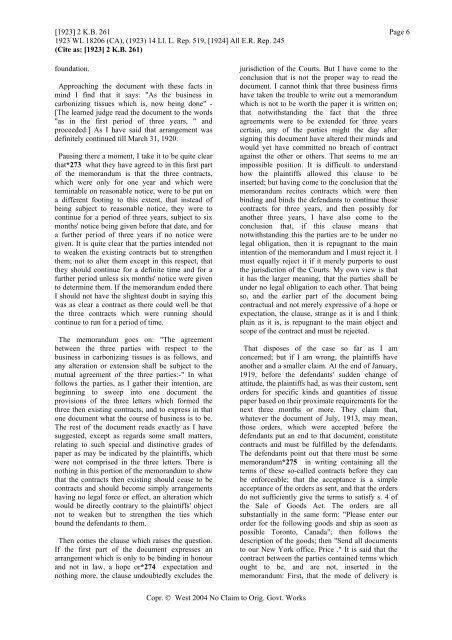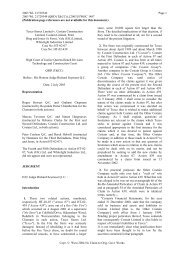Rose - Thomson Reuters
Rose - Thomson Reuters
Rose - Thomson Reuters
Create successful ePaper yourself
Turn your PDF publications into a flip-book with our unique Google optimized e-Paper software.
[1923] 2 K.B. 261 Page 61923 WL 18206 (CA), (1923) 14 Ll. L. Rep. 519, [1924] All E.R. Rep. 245(Cite as: [1923] 2 K.B. 261)foundation.Approaching the document with these facts inmind I find that it says: "As the business incarbonizing tissues which is, now being done" -[The learned judge read the document to the words"as in the first period of three years, " andproceeded:] As I have said that arrangement wasdefinitely continued till March 31, 1920.Pausing there a moment, I take it to be quite clearthat*273 what they have agreed to in this first partof the memorandum is that the three contracts,which were only for one year and which wereterminable on reasonable notice, were to be put ona different footing to this extent, that instead ofbeing subject to reasonable notice, they were tocontinue for a period of three years, subject to sixmonths' notice being given before that date, and fora further period of three years if no notice weregiven. It is quite clear that the parties intended notto weaken the existing contracts but to strengthenthem; not to alter them except in this respect, thatthey should continue for a definite time and for afurther period unless six months' notice were givento determine them. If the memorandum ended thereI should not have the slightest doubt in saying thiswas as clear a contract as there could well be thatthe three contracts which were running shouldcontinue to run for a period of time.The memorandum goes on: "The agreementbetween the three parties with respect to thebusiness in carbonizing tissues is as follows, andany alteration or extension shall be subject to themutual agreement of the three parties:-" In whatfollows the parties, as I gather their intention, arebeginning to sweep into one document theprovisions of the three letters which formed thethree then existing contracts, and to express in thatone document what the course of business is to be.The rest of the document reads exactly as I havesuggested, except as regards some small matters,relating to such special and distinctive grades ofpaper as may be indicated by the plaintiffs, whichwere not comprised in the three letters. There isnothing in this portion of the memorandum to showthat the contracts then existing should cease to becontracts and should become simply arrangementshaving no legal force or effect, an alteration whichwould be directly contrary to the plaintiffs' objectnot to weaken but to strengthen the ties whichbound the defendants to them.Then comes the clause which raises the question.If the first part of the document expresses anarrangement which is only to be binding in honourand not in law, a hope or*274 expectation andnothing more, the clause undoubtedly excludes thejurisdiction of the Courts. But I have come to theconclusion that is not the proper way to read thedocument. I cannot think that three business firmshave taken the trouble to write out a memorandumwhich is not to be worth the paper it is written on;that notwithstanding the fact that the threeagreements were to be extended for three yearscertain, any of the parties might the day aftersigning this document have altered their minds andwould yet have committed no breach of contractagainst the other or others. That seems to me animpossible position. It is difficult to understandhow the plaintiffs allowed this clause to beinserted; but having come to the conclusion that thememorandum recites contracts which were thenbinding and binds the defendants to continue thosecontracts for three years, and then possibly foranother three years, I have also come to theconclusion that, if this clause means thatnotwithstanding this the parties are to be under nolegal obligation, then it is repugnant to the mainintention of the memorandum and I must reject it. Imust equally reject it if it merely purports to oustthe jurisdiction of the Courts. My own view is thatit has the larger meaning, that the parties shall beunder no legal obligation to each other. That beingso, and the earlier part of the document beingcontractual and not merely expressive of a hope orexpectation, the clause, strange as it is and I thinkplain as it is, is repugnant to the main object andscope of the contract and must be rejected.That disposes of the case so far as I amconcerned; but if I am wrong, the plaintiffs haveanother and a smaller claim. At the end of January,1919, before the defendants' sudden change ofattitude, the plaintiffs had, as was their custom, sentorders for specific kinds and quantities of tissuepaper based on their proximate requirements for thenext three months or more. They claim that,whatever the document of July, 1913, may mean,those orders, which were accepted before thedefendants put an end to that document, constitutecontracts and must be fulfilled by the defendants.The defendants point out that there must be somememorandum*275 in writing containing all theterms of these so-called contracts before they canbe enforceable; that the acceptance is a simpleacceptance of the orders as sent, and that the ordersdo not sufficiently give the terms to satisfy s. 4 ofthe Sale of Goods Act. The orders are allsubstantially in the same form: "Please enter ourorder for the following goods and ship as soon aspossible Toronto, Canada"; then follows thedescription of the goods; then "Send all documentsto our New York office. Price ." It is said that thecontract between the parties contained terms whichought to be, and are not, inserted in thememorandum: First, that the mode of delivery isCopr. © West 2004 No Claim to Orig. Govt. Works
















